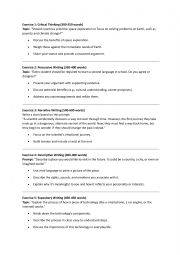
|
Various Types of Writing Exercises
Writing exercises can vary greatly, depending on their purpose and the skills they aim to develop. Here�s a description of different kinds of writing exercises that can be used to strengthen various writing abilities:
1. Opinion Writing (or Argumentative Writing)
These exercises ask the writer to take a position on an issue and defend it with supporting arguments and evidence. They require the writer to organize their thoughts clearly and persuasively, while addressing counterarguments.
Focus: Forming a clear opinion, structuring an argument, and defending it logically.
2. Persuasive Writing
In these exercises, the writer aims to convince the reader to accept a certain viewpoint or take specific action. The writer uses strong arguments, emotional appeals, and sometimes rhetorical devices to persuade the reader.
Focus: Convincing and influencing others through logic and emotion.
3. Descriptive Writing
Descriptive writing exercises focus on helping the writer paint vivid pictures with words. The writer is encouraged to use sensory details—sight, sound, taste, touch, and smell—to create a clear and detailed image of a place, person, or thing in the reader�s mind.
Focus: Painting clear, vivid pictures using sensory details.
4. Narrative Writing
Narrative writing involves telling a story, either real or fictional. These exercises focus on creating a plot, developing characters, and constructing a story with a beginning, middle, and end. It can be structured in a variety of ways, from simple recounting to complex, multi-layered tales.
Focus: Storytelling, plot development, and character creation.
5. Expository Writing
Expository writing is meant to inform or explain. These exercises require the writer to break down a topic or process in a clear, concise way, using facts, examples, and explanations. The goal is to educate the reader rather than persuade or entertain.
Focus: Explaining information clearly and factually.
6. Creative Writing
Creative writing exercises give the writer freedom to invent stories, poems, and imaginative scenarios. They encourage originality, innovation, and self-expression. The goal is to engage the reader through creativity and emotional resonance.
Focus: Originality, imagination, and emotional expression.
7. Reflective Writing
In these exercises, the writer is asked to reflect on personal experiences, thoughts, or ideas. The goal is self-exploration and understanding. Reflective writing can also help develop deeper insights into a topic or personal journey.
Focus: Self-reflection, introspection, and personal growth.
Level:intermediate
Age: +10
Downloads:11 |
|
Copyright 17/1/2025 mery gm
Publication or redistribution of any part of this
document is forbidden without authorization of the
copyright owner.
|


see more worksheets by mery.queen
|